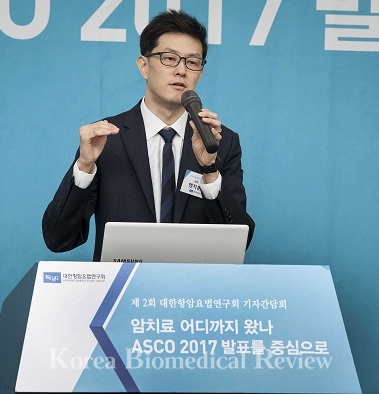Is Korea still a long way from personalized cancer treatment using next generation sequencing (NGS) that is drawing the attention of experts throughout the world?
Professor Maeng Chi-hoon맹치훈 of Kyung Hee University School of Medicine expressed such concerns at a news conference Wednesday, organized by the Korean Cancer Study Group대한항암요법연구회 to introduce researches at American Society of Clinical Oncology(ASCO).

“NGS-based precision medicine is a new treatment going beyond the conventional treatment paradigm, and a global trend,” Professor Maeng said. “However, there are not cases of NGS examination leading to customized treatment. Particularly in Korea, even if we find the mutation (of genes through NGS), it 's hard to use it on patients unless there are appropriate indications (on related treatments institutionally).”
The NGS examination is a technology that finds genes that cause cancers by analyzing patients’ cancer samples and blood and identifying tens of thousands of genes. It can secure many targets to cure cancers at low prices and in a short period. It has received insurance benefits to a limited extent since March.
Professor Maeng said the NGS examination draw particular attention in ASCO. He cited the ProfilER research released in ASCO, saying, “Even though there isn’t statistical significance, the NGS results showed the survival indicators in the patient group who used available therapies were a little higher than another patient group who didn’t use treatments. That suggests if doctors can find NGS-based therapies fit for each patient, treatment results could get better”.
Maeng expected it would take some time for NGS to position itself as a universal cancer therapy, although it has entered commercializing stage. “They conducted NGS tests on 1,944 patients, but only 7 percent of them received treatments appropriate to their mutation,” the professor said.
He added that out of the total 500 patients who underwent Mi-OncoSeq (Michigan Oncology Sequencing Program) mobilizing Whole Genome Sequencing (WGS), Whole Exome Sequencing(WES) and Whole Transcriptome Sequencing(WTS), only 19 percent got personalized treatments that suit the actual mutation of patients. In other words, even if patients undergo NGS examinations, the number of people who could take drugs that suit their cases.
As related clinical trials are going on briskly, both here and abroad, and NGS is certain to become the treatment that can turn customized therapy into reality, however, the government should make productive investment and support, the expert emphasized.
“Currently, the U.S. National Cancer Institute(NCI) is conducting an NCI-MATCH research, involving about 6,000 registered patients. The results of the study will be the basis to determine the use of target therapies through NGS examination in the clinical field,” Professor Maeng said. “To make better use NGS for personalized treatments in medical fields, the industry needs to invigorate various clinical trials and the government should provide greater support for such efforts.”

